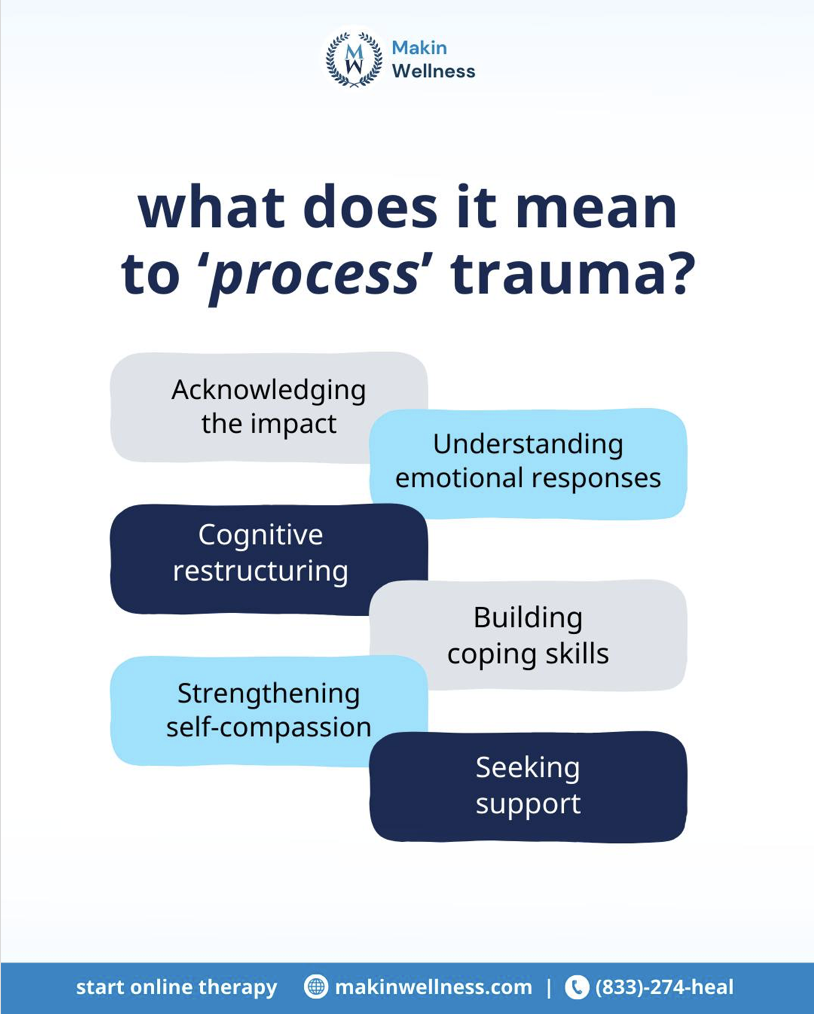If you are someone who has experienced severe trauma, whether once or repeatedly, daily life may look and feel different for you than for those around you. Memories might resurface, and you may experience flashbacks, shame, anxiety, or the inability to relax.
These symptoms of trauma are painful and can be frustrating to manage. You may find yourself struggling in relationships, having to handle triggers, and potentially navigating physical health problems related to your trauma.
If you are carrying trauma, Narrative Exposure Therapy (NET) is one way you can better understand your journey and take a step forward into wholeness. While trauma affects everyone differently, being able to talk about what you have experienced has been proven to change the way your brain functions and help you process what you have experienced.
Finding space to process your trauma – through online therapy, for example – is a major step in moving forward, and can help you return to a sense of normalcy and safety. Narrative Exposure Therapy is one way that you can externalize what needs to be worked through, even if the trauma feels heavy, painful, and difficult to place in your story.
What is Narrative Exposure Therapy?
Narrative Exposure Therapy is a form of online therapy specifically developed to help you process and integrate traumatic experiences into your life story.
NET is designed to reduce symptoms of post-traumatic stress disorder (PTSD) and help manage symptoms of carrying multiple traumas—such as childhood abuse, domestic violence, complex grief, or surviving assault. There are many different types of traumas that may make you a good candidate for NET.
Integration is the process of making sense of your traumatic memories and placing them in the correct order and context within the timeline of your life. This process can help you move forward, as it teaches your brain that the trauma is not continuing to happen or a present danger; rather, it is a past event that will not reoccur.
Your brain occasionally needs help integrating these memories and will create a sense of anxiety or flashbacks because it is trying to keep you safe from the trauma. This response can be unhelpful and inhibit your normal life if you are no longer in an environment where you will experience that trauma again, and you have no real need for this self protective mechanism.
NET is grounded in the belief that healing begins when you can face your traumatic memories with compassionate support, organize them coherently in your memory, and be able to recall your story without PTSD symptoms interrupting your daily function.
Important terms to know when considering Narrative Exposure Therapy:
“Narrative” refers to an account of connected events. In this context, this is the story of your life. The focal point is understanding how events – both positive and negative – connect.
“Exposure” relates to the idea of coming into contact with something– in this case, your story. Rather than avoiding traumatic memories (a very common coping mechanism), you gently revisit them in a safe and controlled setting, guided by a trained therapist.
The aim isn’t to relive the pain; instead, the point of NET is to make sense of it – to learn how to think and talk about what happened so your brain understands that the trauma is not ongoing.
When you can anchor the trauma properly in your timeline, it should no longer inhibit you from living normal daily life. This is a major part of processing your trauma, and it can lead to long term mental and emotional health.

Who Is Narrative Exposure Therapy Best For?
NET is frequently used if you are struggling with PTSD, particularly if you’ve experienced multiple or prolonged traumatic events. It can also be helpful for:
- Survivors of childhood abuse or neglect
- Refugees and asylum seekers with displacement trauma
- Survivors of sexual assault or abuse
- Those who have experienced ongoing bullying or social exclusion
- Individuals affected by generational trauma– family dysfunction, inherited survival patterns, ancestral grief
- Anyone whose traumatic memories are fragmented or causing chronic emotional distress
If you are struggling with multiple traumas or trauma that causes interruptions to your daily life, our counselors would love to talk you through what moving forward looks like. You can reach out to someone online here.
How Trauma Affects Your Brain and Daily Life
Traumatic memories are stored differently than regular memories. Rather than being processed and filed away in your brain’s long-term memory, they often remain vivid, fragmented, and emotionally raw. You might experience:
- Flashbacks or nightmares
- Panic attacks seemingly out of nowhere
- Emotional numbness
- Overreacting to small triggers
- Difficulty concentrating or feeling safe
Research supports that these symptoms are rooted in changes to your brain that occurred because of traumatic events. Trauma rewires your brain’s threat response system, dysregulating your amygdala and hippocampus, which are responsible for emotional regulation and memory consolidation. This is why you may have a hard time with the symptoms above– because your brain is struggling to differentiate past and present threats to your safety.
While coping with trauma is processing things that have deeply hurt and impacted you negatively in the past, trauma affects day-to-day life in the present as well. Trauma has been shown to affect the body as well as the mind, making it imperative that you take steps toward addressing your past if you want to have a well-rounded, healthy present and future.
Having unresolved trauma long term has been shown to affect the health of the person holding the trauma. In other words, your physical health may suffer from a lack of mental health care, and studies even show links to autoimmune diseases, sleep disorders, cardiovascular issues, neurological problems, gastrointestinal diseases, and more.
Even though it may feel like a lot of effort to get help on a mental or emotional level, it is important to understand that living with unresolved trauma doesn’t just affect your mental state and emotions; it can affect your body as well.
Caring for your overall health can be difficult if you have experienced multiple traumas. While avoiding talking about trauma is common, carrying unresolved trauma can be detrimental to your physical health, in addition to living with the adverse mental and emotional disruptions.
In short: trauma can impair your brain’s storytelling system. Narrative Exposure Therapy supports your brain in processing trauma by integrating it into your life story, rather than allowing your nervous system to recall your trauma at unnecessary times.

What Happens During Narrative Exposure Therapy?
Pursuing any type of online therapy can feel unsafe or worrisome if recalling your trauma is difficult for you. Knowing what will happen in a session if you pursue NET can help make this brave step feel less daunting.
Here’s what a typical NET process looks like:
-
Begin to build trust with your online therapist
You’ll first spend time establishing a relationship with your online therapist. Trust and safety are essential. You are in control of the process at every step. You can get to know your online therapist, and they will have time to get to know you before you start diving into more sensitive topics.
-
Create a “lifeline”
Using a physical “lifeline” (like a string or rope, for example), you’ll begin mapping out the events of your life—from birth to today. Significant moments, both joyful and painful, are marked along the way. This creates a visual representation of your journey. Using physical symbols of events – both positive and painful – can help you place events within your timeline and process them, one at a time.
-
Begin to tell your story, one event at a time
Starting at the beginning, you’ll begin narrating your life story to your online therapist, event by event. When you arrive at a traumatic memory, your online therapist will guide you to explore it in detail to help your brain process and place it properly in your timeline—not to traumatize you again.
You may describe:
- What happened
- What you felt at the time
- What thoughts or sensations arise as you remember it now
This exposure to your memory in a safe environment allows your brain to move it from the emotional survival zone to the logical memory center. While this may be uncomfortable at first, over time these events will become further embedded in the time they occurred in your story.
-
Your memories get integrated into your story
The goal of NET is not for you to stay in online therapy indefinitely — it’s to help you finish working through traumatic events when the trauma(s) are integrated into your story. By the end of online therapy, many people report feeling more grounded, self-aware, and hopeful.
The length of sessions and the number of weeks you will be in online therapy depends on your individual needs- like how many traumatic events there were, the nature of said events, your age, if you have other mental health issues, and your level of distress. Your online therapist will be able to discuss in depth what is necessary and make adjustments for your overall health along the way.
Exploring different types of online therapy for your trauma can be daunting. Maybe you’ve tried other forms of online therapy and you still feel haunted by your past. Maybe you have never been in online therapy and are afraid of telling anyone what happened. You are not alone. Exploring NET can be hugely impactful on your overall physical and mental health.
This Journey Isn’t Just For You
One powerful reason many people seek online therapy is not just to feel better for themselves— it’s also a way to stop the cycle of pain for future generations.
Generational trauma refers to traumas that have passed from one generation to the next, whether that is via cycles of abuse, dysfunctional beliefs or behaviors, or having broken relationships modeled to you. You may carry wounds that didn’t start with you.
The cycle does not have to continue in your family or in those around you if you choose to heal. If you think you are carrying generational trauma or would like to learn more about it, check out this blog post.
Ready to Take the Next Step?
You don’t have to face your trauma alone. Choosing to do the hard work of navigating through trauma will affect how you live and function – from how you react to stressful situations, to your health, to those who will come after you. Our compassionate online counselors at Makin Wellness are trained in Narrative Exposure Therapy and ready to walk with you through your mental health journey.
Click here to explore online therapy appointments, or to see a full directory of our specialized Pennsylvania counselors.







